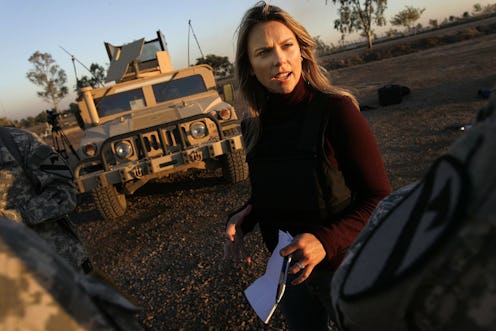News
Lara Logan Asked To Take Leave From CBS
It seems that using dishonest sources to peddle fringe right-wing conspiracy theories doesn’t fly as “news." Following her disgraced 60 Minutes report on Benghazi, which aired in October but was subsequently found to be riddled with inaccuracies, CBS correspondent Lara Logan and her producer, Max McClellan, have both been asked to take a leaves of absence from the network.
The 60 Minutes report, which centered around the 2011 attacks on the American embassy in Libya, drew tons of criticism after it aired, for a lot of reasons. To start, it was highly sensationalized but didn’t contain much in the way of new information about the attacks. More significantly, it was soon revealed that the source whose testimony formed the crux of the report, a British security contractor named Dylan Davies, was lying about most of what he said. The incident led many to question 60 Minutes’ vetting policy, worries that grew after word got out that CBS was also seeking to publish a book by Davies about the incident.
The network subsequently launched an internal investigation to determine what went wrong, and according to documents obtained by Huffington Post, CBS News chairman Jeff Fager has asked Logan and McClelllan to take a leaves of absence. Fage wrote:
There is a lot to learn from this mistake for the entire organization. We have rebuilt CBS News in a way that has dramatically improved our reporting abilities. Ironically 60 Minutes, which has been a model for those changes, fell short by broadcasting a now discredited account of an important story, and did not take full advantage of the reporting abilities of CBS News that might have prevented it from happening.
As a result, I have asked Lara Logan, who has distinguished herself and has put herself in harm’s way many times in the course of covering stories for us, to take a leave of absence, which she has agreed to do. I have asked the same of producer Max McClellan, who also has a distinguished career at CBS News.
As Executive Producer, I am responsible for what gets on the air. I pride myself in catching almost everything, but this deception got through and it shouldn’t have.
CBS ultimately retracted the report, and Logan, the network’s chief foreign affairs correspondent, apologized for it. But even Logan’s apology was criticized, as it didn’t offer any explanation as to why the network violated standard journalistic protocol by relying on a single source for a story, nor why it failed so spectacularly at verifying that source’s testimony before airing the report.
[Embed]
The results of the network’s internal report on the episode represent a slightly more honest mea culpa, with Fager outlining in detail how exactly the network erred in its reporting. Fager also admits that there was a conflict of interest in both the book that CBS planned to publish and in Logan herself:
--In October of 2012, one month before starting work on the Benghazi story, Logan made a speech in which she took a strong public position arguing that the US Government was misrepresenting the threat from Al Qaeda, and urging actions that the US should take in response to the Benghazi attack. From a CBS News Standards perspective, there is a conflict in taking a public position on the government’s handling of Benghazi and Al Qaeda, while continuing to report on the story.
--The book, written by Davies and a co-author, was published by Threshold Editions, an imprint of Simon & Schuster, part of the CBS Corporation. 60 Minutes erred in not disclosing that connection in the segment.
Of course, that’s not exactly an explanation as to why the report proceeded despite these conflicts of interest, but at least the network isn’t trying to sugarcoat where and how it went wrong.
This most recent episode is the latest twist in Logan’s perpetually-evolving, often contradictory reputation as a news journalist. While reporting on the ground in Egypt during the 2011 revolution that led to the ouster of President Hosni Mubarek, Logan was brutally raped by a mob of protesters. She told the story of her attack in graphic detail on 60 minutes, and spent four days in the hospital afterwards for cuts, bruises, and internal tearing. In addition to the fact that she suffered enormously for the cause of journalism, Logan was praised for speaking drawing attention to the problem of female journalists being sexually assaulted while reporting abroad, a rarely addressed but sadly common phenomena.
And yet Logan’s reporting methods, along with her basic journalistic philosophy, have also been called into question by her peers. When Michael Hastings reported some incendiary remarks made by General Stanley McChrystal in 2010, remarks that ultimately got McChrystal fired, Logan said that good reporters shouldn’t make the U.S. military look bad, and criticized Hastings for violating the general’s trust. Many journalists subsequently pointed out that, contrary to Logan’s claims, acting as a mouthpiece for the Pentagon doesn’t constitute good reporting, and is indeed contrary to the entire spirit of a free press.
